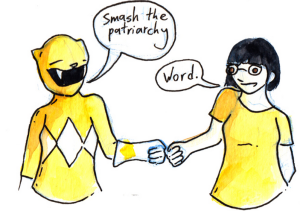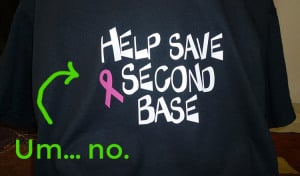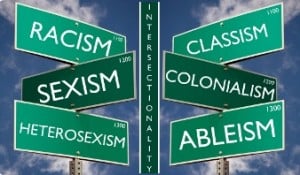I used to roll my eyes and scroll past articles that talked about racism.
I can’t believe I’m admitting that here, but it’s true, I did.
I’m a white woman, and I used to think that discussions about race didn’t concern me. As soon as someone took a conversation about gender and began to add a racial analysis to it, I would zone out.
I used to think, “Racism doesn’t affect me, so why should I care?”
Ouch.
I thought that race and gender were two distinct issues.
But what I know now is 1) intersectional feminism means that I should care about issues that don’t necessarily affect me, because that’s generally a good rule for being a decent human, and 2) the fact that I am a white person is exactly why I should care about racism.
But before I knew those things, I was the very picture of white feminism.
What is white feminism? If you’re new to the term, there’s been a lot already written on the topic. A great place to start is here. Go read up, and come back. I’ll wait.
Put simply, white feminism is a form of feminism (usually, but not always) practiced by some white people (usually, but not always, women) that sees gender as a separate issue from all other identities.
White feminism lacks any intersectionality. It fails to take other issues into context when it examines gender.
Furthermore, white feminism, in its antagonism of Black people, often erases and invisibilizes other people of color from the conversation. Race is often reduced to a Black and White issue, when there are so many other races that need to be acknowledged.
Now, it is possible to be a white feminist who doesn’t practice white feminism. It’s something that I strive to do every day.
I don’t always succeed, of course. I’m still a white person in a white supremacist world who has internalized those messages. Dismantling them takes a lifetime.
And that is what I hope to do with my feminism – dismantle white supremacy (among other things). As I was writing this piece, Nashwa Khan’s Twitter gave me a really good nugget for thought about white people distancing themselves from whiteness versus dismantling whiteness.
Whoa.
One of the ways I personally try to remember that, despite my racial justice activism, I am not any better than other white people is that, when addressing white folks who may not be at the same place in understanding racism as I am, I include myself in the sentence.
So instead of saying “White people, you need to stop doing This Thing,” I say, “White people, we need to stop doing This Thing.” It’s a small tweak, but it’s important. It holds me accountable and doesn’t allow me to distance myself from any white violence that I perpetrate myself.
At the end of the day, I am still a white person, with white skin. Regardless of my politics, my white skin is still oppressive to people who do not have it.
And what I want to do right now is have a chat with other women women who maybe think, like I used to, that race and gender are two separate things.
Are you a white feminist who doesn’t want to discuss racism? Hey, I get it. I used to be, too.
But here are some things I’ve learned that you might want to think about:
1. We Don’t Get to Determine What’s Racist
How often do we see something posted about racism, only to then see a bunch of white people jump into the comments to argue about why that thing isn’t actually racist?
For example, maybe someone calls out Kylie Jenner for appropriating Black culture with her braided hair. Or maybe they’re pointing out why white people wearing bindis as a fashion statement isn’t cool.
And then a white person comments, “Um, it’s just hair” or “Bindis have nothing to do with skin color.”
Or perhaps someone is venting about a racial microaggression they experienced when they were out to dinner, where they felt like they were treated differently by their server because they’re Black.
And the next thing you know, a white person swoops in to say something like, “Wait, how do you know it was because you were Black? I think you’re being paranoid. It was probably just because the server was having a bad night.”
But here’s the thing, fellow white people – it’s not on us to decide what is or isn’t racist because we don’t actually experience racism.
The people who are experts on racism and therefore get to determine what is racist are the people who live it everyday – people of color.
What Can You Do Instead?
This one is simple: For the love of god, please stop arguing with people of color about what is or isn’t racist.
I don’t always understand why something is racist or offensive at first. But I don’t have to understand in order to say, “Oh, okay. I won’t do/say that again.”
What matters is that someone who has an identity that I don’t says that something is harmful. That’s enough for me because I don’t want to hurt anyone. If all it takes is for me to stop doing or saying that thing.
I don’t think that’s asking all that much.
If you want to be an ally to people of color, it’s a good idea to not debate or discredit the lived experiences that they are sharing. Believe them as the experts on their own lives.
2. Black (And Brown) Lives > White Feelings
Have you ever read something written by a person of color and immediately gotten upset because it made you feel really bad?
I have.
Have you ever commented then about how hurtful the initial comments were? Maybe said something to the effect of, “Just because some Muslims are being profiled as terrorists and being unfairly targeted because of it doesn’t mean you have to attack white people.”
If this feels familiar to you, I’d highly suggest that you refrain from jumping onto a thread about people of color being victims of fatal violence to talk about your feelings.
Because at the end of the day, Black and brown people are literally losing their lives at the hands of our state, simply because of the color of their skin.
Their lives are way more important than our feelings. Always.
We might feel a little uncomfortable with some commentary. They risk death every day of their lives, whether they’re in their home or outside of it.
These two things cannot be compared in any way.
What Can You Do Instead?
Sit with your discomfort.
It’s okay to be uncomfortable, and it’s okay to not understand why you can’t talk about those feelings publicly.
But friends of color shouldn’t have to witness you working out your white guilt on their timelines.
That’s something you should do privately, with another white person. Talk to someone else who is an ally in racial justice about how you’re feeling and work it out with them.
Get involved with organizing other white people for racial justice. Showing Up For Racial Justice is a great organization of white folks with chapters all over the United States.
3. Being ‘Colorblind’ Isn’t Actually a Good Thing (Or a Real Thing, For That Matter)
I’m embarrassed to admit that “I don’t see race!” is something that I actually used to say (and aspire to make true). But it’s something that white people say all the time when the subject of race and racism comes up.
Or maybe you’ve said, “We’re all one race: the human race.”
In theory, this sounds pretty good, right? And, while yes, you should see everyone the same when it comes to their humanity and their inherent value, being “colorblind” isn’t actually the same as not being racist (and, in fact, it actually is racist).
And let’s just stop right here to acknowledge that it’s not just the concept of “colorblindness” that is problematic – the word itself is ableist language.
The first problem with colorblind ideology is that it’s, um, bullshit. Unless someone is physically blind, it’s not realistic to say that they just don’t notice the race of a person. When someone is in front of you, if you have the physical ability to see, you will notice what color their skin is.
But beyond the physical improbability of it, viewing someone completely devoid of racial context actually ignores the very real lived experience of the person standing in front of you.
Someone’s race affects the way they move through the world, the way the world treats them, may reflect their culture, and cannot be separated from who they are as a person. It’s the same way that my identity as a woman influences who I am as a person and the way I’ve experienced and interacted with the world.
What Can You Do Instead?
Don’t judge people based on their race, but don’t invalidate their identity, either.
View them as whole, complete people, with many factors that contribute to who they are, with their race being one of them.
4. Yes, Everything Actually Is About Race, So Stop Telling People of Color Not to ‘Make It About Race’
Every time a white person tells a person of color not to make it about race, what we’re really doing is silencing them.
Because that’s what telling someone not to “play the race card” is: a silencing tactic.
It’s something that white people do to get people of color to stop talking about the racism that they experience. And when we do that, we are actively contributing to that racism.
What Can You Do Instead?
Instead of silencing people of color, work on amplifying their voices.
Talk less, pass the mic more.
5. Refrain from #NotAllWhitePeople-ing
Have you ever read an article or a comment thread where people of color are calling out this really racist thing that white people do, and found yourself getting really uncomfortable?
I have. It’s a terrible feeling, and one that makes me want to get really, really defensive and yell, “But I don’t do that!” I want people to know that I’m a good person, and I’m not racist.
But what I’ve learned is that feeling of discomfort is actually my white privilege being challenged. And sitting with that discomfort is necessary for growth.
And racism is systemic. While individual people contribute to racism, the problem isn’t actually about me or you as people. It’s about larger systems that are at play.
Making it about you (or me) distracts from the very real, very important issue at hand.
It centers whiteness in a conversation about people of color.
What Can You Do Instead?
If you feel yourself getting defensive or wanting to #NotAllWhitePeople in the comments, that’s a great time to just. not. say. anything.
Seriously. Shut up, sit down, and listen.
I know how hard that is.
As white people, we’re often socialized to think that our words and thoughts have more value than anyone else’s, but that’s not true. That’s white supremacy at work.
And undoing that conditioning is hard, but we have to be willing to do hard things if we hope to help dismantle racist systems.
6. It’s a Privilege to Be Able to Disengage from Conversations or Thoughts About Racism
I want to ask you a question: Who gets to look away, close the browser, and move on with their day and who doesn’t?
Hint: It’s not people of color who have the option of not thinking about racism anymore if they don’t want to.
As white people, we have the privilege of deciding that we don’t want to think about this difficult, uncomfortable topic if we don’t want to.
But for people of color, who live in a racist world every day and bear the brunt of that racism, they don’t have that option.
What Can You Do Instead?
The fact that we have the ability to stop thinking about racism is exactly why we shouldn’t. Challenge yourself to not look away.
Engage with the reality of our racist society, the racism that permeates every aspect of our world. Engage other white people in conversations about it, whether it’s by posting about it on your social media accounts or talking about it at your family dinners.
My social media feed may talk about racism and white supremacy too much. But what I’m doing is forcing my white friends from high school, who still live in an all-white bubble, to think about something outside of their lived reality.
And every month or so, a white friend of mine reaches out privately to tell me that the things I post have changed the way they think about the world. And, for me, that’s enough for me to keep doing it.
Another way to be an ally to your friends of color (and this is one I learned the hard way, after someone I cared very deeply about told me that he couldn’t talk to me at that time when I checked in with him after Darren Wilson wasn’t indicted for killing Mike Brown. “It’s not personal,” he said. “It’s your whiteness”):
Try not to vent about racism to your friends of color.
Even if you think you want to commiserate over this awful thing that happened or can you believe how messed up cops are, don’t. Your friends are tired, and hearing about this shit over and over is triggering (and something they already know).
Not only that, discussing race with white people can be exhausting, or even violent, for people of color. It’s talking to your oppressor about your oppression.
Instead, talk to other white people about it.
7. Don’t ‘Whitesplain’ Racism
“Whitesplaining” is a term used to describe the act of a white person explaining racism to a person (or people) of color.
This doesn’t even necessarily have to mean that you’re explaining away racism, or explaining what was really meant by the scenario that a person of color is bringing attention to for being racist. Though it can be that.
It can also be a white person with a pretty decent analysis and understanding of white supremacy explaining to a person of color what that analysis is, like the white person is the expert.
I’m guilty of this one myself, particularly because so many of my friends are people of color with a passion for social justice. We all read the same theory (usually written by… wait for it… people of color) and it can be easy to find myself explaining these things I’ve learned to them.
Ouch.
What Can You Do Instead?
One of the most helpful things I’ve learned is to defer to people of color in conversations about race, whether that’s by linking to things written by them or sharing information that you learned from them (while being clear that you did not come up with this idea. Give credit where credit is due: to people of color).
Another way to do this is by not jumping into a comments thread to educate people when people of color are already on the thread and can handle themselves.
However, it’s not people of color’s job to educate other white people, and the only time it is acceptable to jump on a thread is to collect other white people who are engaging in racist or problematic behavior.
We should aspire to talk less and amplify voices more.
***
At the end of the day, as white people, we don’t have the option of not talking about race if we hope to see a more just world.
Racism is a white problem, and we, as white people, need to address it and engage with it if we hope to end it.
[do_widget id=’text-101′]
Britni de la Cretaz is a Feature Writer for Everyday Feminism. She is a feminist momma, community organizer, freelance writer, and recovered alcoholic living in Boston. She’s a founding member of Safe Hub Collective. Follow her on Twitter at @britnidlc. Read her articles here.
Search our 3000+ articles!
Read our articles about:
Our online racial justice training
Used by hundreds of universities, non-profits, and businesses.
Click to learn more





















